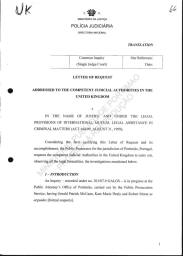Letters Rogatory Explained: Facilitating Legal Cooperation Between Countries

Meaning of Letters Rogatory
Letters rogatory are official requests made by a court in one jurisdiction to a court in an additional territory, seeking help in obtaining evidence or statement for a lawful proceeding. This step-by-step device is necessary in the context of worldwide regulation, where lawful systems may vary, and cross-border collaboration is essential. Letters rogatory promote the celebration of info that may be vital for adjudicating instances, particularly in instances involving complex transnational concerns.
Commonly, these demands occur in civil, criminal, or management matters where a party needs proof that lies outside the territory of the asking for court. The letters offer as a means to guarantee that the principles of due process are maintained, making it possible for courts to accessibility proof that might otherwise remain inaccessible due to legal or geographic barriers.
Making use of letters rogatory is governed by international treaties, reciprocal agreements, or domestic laws, which delineate the procedures and obligations of the courts entailed. It is essential to keep in mind that the implementation of such demands is not ensured; they depend upon the legislations and methods of the jurisdiction receiving the letter. Thus, letters rogatory are a pivotal device for cultivating lawful teamwork and guaranteeing justice across borders.
The Process of Issuing Letters Rogatory
Issuing letters rogatory includes an organized procedure that ensures compliance with both international and residential lawful requirements. The requesting party, usually a court or legal authority, composes a formal demand outlining the nature of the support looked for, the proof or information required, and the legal basis for the demand. This file has to be exact to help with understanding by the international jurisdiction.

The next action entails transferring the letters rogatory to the assigned foreign authority. This is typically done with diplomatic channels or global lawful help frameworks, guaranteeing that the request is gotten and acknowledged by the international court. The international court then processes the demand according to its very own legal procedures, ultimately reacting to the asking for celebration with the popular information or proof, therefore helping with international lawful teamwork.
Value in International Law
The significance of letters rogatory in global legislation can not be overstated, as they function as a critical system for judicial collaboration throughout borders. These formal demands for support in lawful matters allow courts in one territory to seek details, evidence, or the visibility of witnesses from one more territory, thus facilitating the management of justice in transnational instances.
Letters rogatory are especially vital in the context of globalization, where legal disagreements commonly span several countries. They enable the collection of proof that might or else be inaccessible, making sure that lawful procedures are educated and fair. By cultivating collaboration in between judicial systems, letters rogatory aid support the regulation of law and advertise common respect amongst countries.
Moreover, using letters rogatory shows a commitment to worldwide standards and concepts of cooperation, showing the interconnected nature of modern-day legal methods. It the original source highlights the importance of adhering to well established treatments and treaties, such as the Hague Convention, which provides a structure for these requests - Letters rogatory. Ultimately, letters rogatory enhance the effectiveness of lawful processes, guaranteeing that justice is not prevented by geographical borders
Challenges and Limitations
Despite their value, letters rogatory face numerous obstacles and limitations that can impede their efficiency. One main concern is the differing legal frameworks and treatments throughout territories, which can cause misconceptions and hold-ups in the implementation of demands. Various nations might have distinctive needs for the legitimacy of letters rogatory, making complex the procedure better.
In addition, the often protracted nature of international legal collaboration can hinder timely access to evidence or witnesses. This hold-up might detrimentally influence legal procedures or i thought about this ongoing investigations, especially in cases calling for immediate activity. The absence of sources and training in some territories can result in inadequate handling of demands, leading to insufficient or insufficient feedbacks.
Countries with much less official legal systems may battle to comply with the step-by-step roughness expected in letters rogatory. These difficulties demand continuous dialogue and reform to boost the efficacy of letters rogatory in legal participation.
Instance Studies and Examples

Conversely, obstacles can arise, as seen in an instance including a European nation seeking evidence in a recurring criminal matter from a non-EU country - Letters rogatory. The process was postponed due to administrative hurdles and varying legal requirements, inevitably hindering the examination
These examples show that while letters rogatory can help with international participation and quicken lawful process, they additionally highlight the requirement for clear communication and understanding of legal structures in between nations. Such study highlight the value of refining this device to enhance performance and performance in global lawful matters.
Verdict
In recap, letters rogatory serve as an important mechanism for facilitating lawful teamwork in between nations, guaranteeing the collection of proof and testimony throughout territories. Their relevance in international regulation can not be overstated, as they promote due process and enhance the effectiveness of cross-border legal process.
Letters rogatory are official demands made by a court in one territory to a court in one more jurisdiction, seeking support in acquiring evidence or statement for a legal case. The asking for party, commonly a court or lawful authority, prepares an official demand outlining the nature of the aid looked for, the evidence or details needed, and the legal basis for the demand. The foreign court then processes the request from this source according to its own legal treatments, eventually responding to the asking for celebration with the in-demand information or evidence, thus promoting global legal collaboration.
Additionally, the use of letters rogatory demonstrates a dedication to global norms and principles of collaboration, mirroring the interconnected nature of modern-day lawful methods.Global lawful collaboration via letters rogatory is not without its real-world implications, as shown by numerous instance studies that highlight both obstacles and successes.